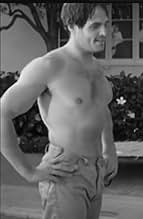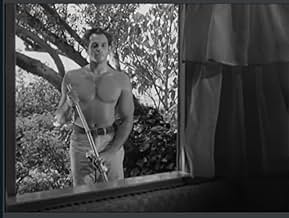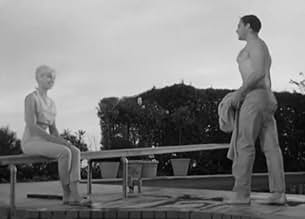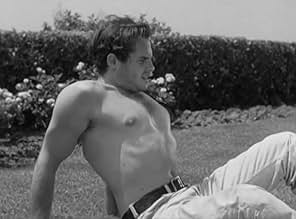IMDb RATING
6.7/10
1.4K
YOUR RATING
An arrogant criminal offers to seduce a woman for his dim, sexually inexperienced partner.An arrogant criminal offers to seduce a woman for his dim, sexually inexperienced partner.An arrogant criminal offers to seduce a woman for his dim, sexually inexperienced partner.
- Director
- Writer
- All cast & crew
- Production, box office & more at IMDbPro
Featured reviews
Duke (Corey Allen) and Boots (Warren Oates), two young thugs, hold up a California gas-station owner. Duke, virile and savage, taunts the slower and psychologically-confused Boots because he has never made a sexual conquest.
This film came about due to press agent Stanley Colbert, who hoped to move Leslie Stevens from Broadway (where he was a playwright) to Hollywood. Along the way, Colbert introduced Sevens to Kate Manx, and they were soon wed. The three combined birthed Daystar Productions, and with it, "Private Property".
The hiring of the camera crew happened by accident, and was fortuitous; the picture looks great. Colbert hired a nobody, Conrad Hall. And Hall brought with him a minor legend: Ted McCord, a veteran of "East of Eden" and "Treasure of Sierra Madre", as well as scores of others. Hall today is better known than McCord, as he went on to great things over the next three decades -- not only as a regular under Stevens on "Outer Limits", but as the cinematographer for such classics as "Cool Hand Luke" and "American Beauty".
How long has this film been buried? Apparently it had become largely lost and forgotten because it couldn't get a production seal in America. Today, the film is tame, but apparently not then. Making a profit in Europe before disappearing, in 2016 it was recovered and given the proper Blu-ray treatment. If nothing else, it deserves this for the names involved: Leslie Stevens (creator of "The Outer Limits"), Corey Allen ("Rebel Without a Cause" and Warren Oates ("Dillinger"). These three men had only just begun in 1960, but were each soon giants in their own way.
But it also stands on its own as an interesting crime film. Part home invasion story, part "Without Warning", and part "Of Mice and Men", it is hard to categorize. Not quite film noir, but still something different. It almost evokes the feeling of a BBS film, something independent that might have been more at home in the 1970s. Coupled with strong performances from the three leads, it is worth tracking down. There is an unusual exchange between Manx and Allen when he reveals that he has been squatting next door that has to be seen to be believed, it is so hypnotic.
The Blu-ray's greatest feature is the film itself, but it also has some highly informative liner notes and an 18-minute interview with photographer Alexander Singer. Singer covers a wide range of topics, from his time on Kubrick's "Killer's Kiss", to the more technical explanations of "softening" the lens and how it has been accomplished over the years.
This film came about due to press agent Stanley Colbert, who hoped to move Leslie Stevens from Broadway (where he was a playwright) to Hollywood. Along the way, Colbert introduced Sevens to Kate Manx, and they were soon wed. The three combined birthed Daystar Productions, and with it, "Private Property".
The hiring of the camera crew happened by accident, and was fortuitous; the picture looks great. Colbert hired a nobody, Conrad Hall. And Hall brought with him a minor legend: Ted McCord, a veteran of "East of Eden" and "Treasure of Sierra Madre", as well as scores of others. Hall today is better known than McCord, as he went on to great things over the next three decades -- not only as a regular under Stevens on "Outer Limits", but as the cinematographer for such classics as "Cool Hand Luke" and "American Beauty".
How long has this film been buried? Apparently it had become largely lost and forgotten because it couldn't get a production seal in America. Today, the film is tame, but apparently not then. Making a profit in Europe before disappearing, in 2016 it was recovered and given the proper Blu-ray treatment. If nothing else, it deserves this for the names involved: Leslie Stevens (creator of "The Outer Limits"), Corey Allen ("Rebel Without a Cause" and Warren Oates ("Dillinger"). These three men had only just begun in 1960, but were each soon giants in their own way.
But it also stands on its own as an interesting crime film. Part home invasion story, part "Without Warning", and part "Of Mice and Men", it is hard to categorize. Not quite film noir, but still something different. It almost evokes the feeling of a BBS film, something independent that might have been more at home in the 1970s. Coupled with strong performances from the three leads, it is worth tracking down. There is an unusual exchange between Manx and Allen when he reveals that he has been squatting next door that has to be seen to be believed, it is so hypnotic.
The Blu-ray's greatest feature is the film itself, but it also has some highly informative liner notes and an 18-minute interview with photographer Alexander Singer. Singer covers a wide range of topics, from his time on Kubrick's "Killer's Kiss", to the more technical explanations of "softening" the lens and how it has been accomplished over the years.
Private Property is a great little neo noir vehicle, outstanding in that its inherent quality, belies the shoestring budget upon which it was made. All the creative elements fortuitously came together for writer/director Leslie Stevens. He gets a great central performance from Corey Allen as deviously shrewd drifter Duke, as well as a distinctly arousing turn from Kate Manx as domestic goddess Ann, seemingly the object of every man's desire, apart from her husband Roger. Then on top of all that, he manages to score the highly experienced Ted McCord as his cinematographer. He must have thought all his Christmases had come at once.
One part home invasion, one part voyeuristic thriller, and one part social critique, considering it was made 60 years ago, Private Property still manages to be quite confronting. It's fairly upfront in its treatment of sexual themes and desires. It looks remarkably good for a film made on such a low budget, even going as unexpectedly far, as featuring some quite extensive underwater photography. I have to be honest and balance my praise, when adding the musical soundtrack however is frequently over-intrusive and not always quite appropriate, for the accompanying scenes.
Stevens comfortably helms the project making excellent use of both his car and home to site the majority of the action. On the evidence of this film, one feels it's a pity we didn't see more cinema work from him, as for much of his career, he worked in theatre, later transitioning to television, where he is arguably best remembered as being the creator of the original Outer Limits.
One part home invasion, one part voyeuristic thriller, and one part social critique, considering it was made 60 years ago, Private Property still manages to be quite confronting. It's fairly upfront in its treatment of sexual themes and desires. It looks remarkably good for a film made on such a low budget, even going as unexpectedly far, as featuring some quite extensive underwater photography. I have to be honest and balance my praise, when adding the musical soundtrack however is frequently over-intrusive and not always quite appropriate, for the accompanying scenes.
Stevens comfortably helms the project making excellent use of both his car and home to site the majority of the action. On the evidence of this film, one feels it's a pity we didn't see more cinema work from him, as for much of his career, he worked in theatre, later transitioning to television, where he is arguably best remembered as being the creator of the original Outer Limits.
Very few people seem to have heard of, let alone seen, this bizarre and strange film, but it is ripe for re-discovery as a precursor of the harsher realism that American movies were able to explore once censorship restrictions were lifted. It is open to all sorts of interpretation; is it a critique of capitalism in which the marriage partner becomes "property"? Is there a hidden homosexual motivation between the two buddies who can, apparently, only attain their "manhood" when in the company of each other? It is perhaps wrong to read too much into early movies using today's sensibilities, but subversive this film most certainly is, and reflects much of the thinking expressed in a ground-breaking book of that era entitled "The American Sexual Tragedy". Passion, when repressed, always runs morbid, and this film illustrates that notion with realism and skill.
This black and white film produced in 1959 is tame compared to what is out there nowadays. Corey Allen, who is best remembered as the gang leader in the movie "Rebel Without A Cause" (1955), is very good as the sexy stud drifter. He shows up at the house of a luscious blonde housewife saying he is looking for yard work. Her much older husband is away on a business trip. There are plenty of shirtless shots of the muscular and hairy chested Allen who knows the wife is sexually attracted to him. They wind up in bed and then things get wild. His dense sidekick is played by actor Warren Oates in an early role.
This legendary, presumed lost film is now available is very good print on blu-ray and DVD. Was it worth the wait? I'd say yes. PRIVATE PROPERTY is artfully photographed and has a very capable cast who give convincing performances. The film is short and to the point: a crime thriller with some subtext, that holds a viewer's interest and sustains plenty of tension. It's not some lost masterpiece, but an accomplished minor film that is somewhat ahead of its time in frankness about some sexual matters.
Corey Allen (Duke), Warren Oates (Boots) play drifters who have apparently just met. Duke is the stronger personality and clearly a manipulating sociopath. He dominates Boots, promising a sexual initiation with a beautiful suburban housewife Ann (Kate Manx). The men have followed Ann to her home by way of nearly car-jacking another driver (Hollywood veteran Jerome Cowan). They hole up in an unoccupied house next door and watch Ann as she swims and sunbathes. All the while, Duke stokes Boots' sexual frustration. It's never clear just how much Boots actually wants Ann. He's clearly under Duke's spell, and soon Ann will be as well. Once Ann's husband leaves on a business trip the film kicks into high gear. There is a nice, moody, late-50s feeling to much of this film, especially in the scenes set inside Ann's home. But unlike most films of the era, PRIVATE PROPERTY has a frankness about sexual matters and sociopathy. Possibly only PSYCHO or PEEPING TOM (both also released in 1960) dared to openly portray violent sexual deviancy in similar ways. PRIVATE PROPERTY is nowhere near those films, artistically speaking, but it's still pretty strong stuff to watch. Leslie Steven's direction is economical and well paced. Thanks to Ted D. McCord, the film has an attractive look, occasionally resembling TV drama from the period. Pete Rugolo's score adds a lot to the atmosphere. Best of all are the actors. Manx is very affecting and it's too bad she did not appear in more films. Corey Allen (always underrated, even after a well- remembered sequence in REBEL WITHOUT A CAUSE) gives the strongest performance. He's very adept at playing on the other characters' weaknesses to achieve his own ends. And Warren Oates at the beginning of his career is a standout as the weak-willed, sexually conflicted Boots. It's great to finally have this film in such a terrific edition.
Corey Allen (Duke), Warren Oates (Boots) play drifters who have apparently just met. Duke is the stronger personality and clearly a manipulating sociopath. He dominates Boots, promising a sexual initiation with a beautiful suburban housewife Ann (Kate Manx). The men have followed Ann to her home by way of nearly car-jacking another driver (Hollywood veteran Jerome Cowan). They hole up in an unoccupied house next door and watch Ann as she swims and sunbathes. All the while, Duke stokes Boots' sexual frustration. It's never clear just how much Boots actually wants Ann. He's clearly under Duke's spell, and soon Ann will be as well. Once Ann's husband leaves on a business trip the film kicks into high gear. There is a nice, moody, late-50s feeling to much of this film, especially in the scenes set inside Ann's home. But unlike most films of the era, PRIVATE PROPERTY has a frankness about sexual matters and sociopathy. Possibly only PSYCHO or PEEPING TOM (both also released in 1960) dared to openly portray violent sexual deviancy in similar ways. PRIVATE PROPERTY is nowhere near those films, artistically speaking, but it's still pretty strong stuff to watch. Leslie Steven's direction is economical and well paced. Thanks to Ted D. McCord, the film has an attractive look, occasionally resembling TV drama from the period. Pete Rugolo's score adds a lot to the atmosphere. Best of all are the actors. Manx is very affecting and it's too bad she did not appear in more films. Corey Allen (always underrated, even after a well- remembered sequence in REBEL WITHOUT A CAUSE) gives the strongest performance. He's very adept at playing on the other characters' weaknesses to achieve his own ends. And Warren Oates at the beginning of his career is a standout as the weak-willed, sexually conflicted Boots. It's great to finally have this film in such a terrific edition.
Did you know
- TriviaShot in ten days on a budget just under $60,000.
- GoofsAfter Ann returns the belt to Boots, he immediately puts it on. A few scenes later, he is seen without the belt and in a later scene, he is again wearing the belt.
- ConnectionsFeatures L'invraisemblable vérité (1956)
- SoundtracksBeyond a Reasonable Doubt
by Herschel Burke Gilbert and Alfred Perry
- How long is Private Property?Powered by Alexa
Details
- Release date
- Country of origin
- Language
- Also known as
- Propiedad privada
- Filming locations
- Hollywood Hills, Los Angeles, California, USA(Ann Carlyle's house)
- Production companies
- See more company credits at IMDbPro
Box office
- Budget
- $60,000 (estimated)
- Runtime
- 1h 19m(79 min)
- Color
Contribute to this page
Suggest an edit or add missing content














